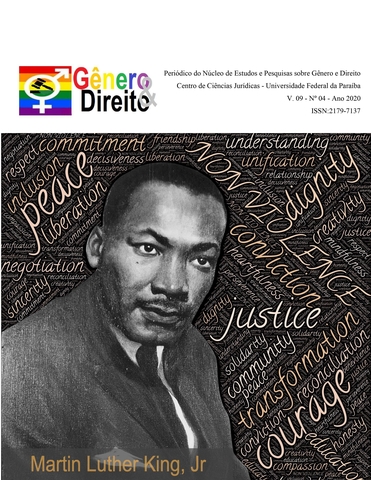IDENTITY AS A SOCIOCULTURAL FACTOR AND A SOURCE OF MODERN ETHNIC CONFLICTS
DOI:
https://doi.org/10.22478/ufpb.2179-7137.2020v9n04.52783Palavras-chave:
ethnos, ethnic conflict, India, European countries, Middle East, Africa, identity, sociocultural factor, societyResumo
Ethnic conflict as a destructive phenomenon of modern human civilization is the object of the study. The specific subject under examination is identity that presents one of the characteristic foundations of an ethnic group. The research goal identified by the authors is to conduct an analysis of the identities of the ethnic groups of India, Middle East, and African and European countries to identify their characteristic features and sources, as well as examine them as a sociocultural factor in the system of ethnic conflict origin and development.
The theoretical basis is composed of a set of scientific papers examining the process of the formation of ethnic groups and conflicts, sociological survey results, and statistical data. The methodological foundation of the study is formed by the retrospective analysis of scientific works revealing the process of ethnic group formation and the systematic approach that allowed identifying and justifying the role of identity in the genesis of ethnic groups and the structure of modern ethnic conflicts. The epistemological potential of statistical and sociological methods of quantitative and qualitative research made it possible to adequately interpret the current scientific research results regarding the hypothesis proposed by the authors. The novelty of the study and its results are determined by the original approach towards identifying the characteristic features of identity and studying its systemic relationships with the nature of modern ethnic conflicts. The results acquired in the course of the study support the conclusion that identity plays a significant role in the process of ethnic group formation, is closely intertwined with other characteristics of ethnos, and contains a specific structure of elements classified by the authors into three groups. In the context of the formation of dangers and threats to the identity, the ethnic group takes comprehensive action to counter it, which ultimately leads to the emergence and development of the ethnic conflict.
Downloads
Referências
Cordell K, Wolff S. (2010). Ethnic Conflict: Causes-Consequences-Responses. Cambridge: Polity Press.
Eller J. (1997). Ethnicity, Culture, and "The Past". Michigan Quarterly Review, 36(4).
Encyclopædia Britannica. (n.d.). Ethnic conflict. Retrieved February 29, 2020 from: http://www.britannica.com/topic/ethnic-conflict
Horowitz D. (1985). Ethnic Groups in Conflict, Berkeley. CA: University of California Press.
Irobi E. (2005). Ethnic Conflict Management in Africa: A Comparative Case Study of Nigeria and South Africa. Retrieved December 29, 2019 from:: https://www.beyondintractability.org/casestudy/irobi-ethnic/#1
Khan O. (2015). Ethnic inequality is widespread and a drag on the global economy. Retrieved December 29, 2019 from: https://www.theguardian.com/public-leaders-network/2015/jan/20/ethnic-inequality-widespread-global-economy
Lipshutz RD. (1998). Seeking a State of One's Own: An Analytical Framework for Assessing Ethnic and Sectarian Conflicts. The Myth of Ethnic Conflict. Beverly, 1, 44.
Rajeswari P. (n.d.). Ethnic Conflicts in South Asia: Cases of India And Sri Lanka. Retrieved June 29, 2019, from: https://www.idsa-india.org/an-sep-9.html
Schlichting U. (1997). Conflict Between Different Nationalities: Chances for and Limits to Their Settlement in Andreas Klinke, Ortwin Renn & Jean-Paul Lehners, eds, Ethnic Conflicts and Civil Society. Aldershot: Ashgate Publishing Ltd.
Smith D. (2003). Trends and Causes of Armed Conflicts, in Alexander Austin, Martina Fischer & Norbert Ropers, eds, Berghof Handbook for Conflict Transformation. Berlin: Berghof Research Centre for Constructive Conflict Management.
Smith T, Silva L. (2011). Ethnic identity and personal well-being of people of color: a meta-analysis. J. Couns. Psychol. 58, 42–60.
Verkuyten M. 2012. The Social Psychology of Ethnic Identity. New York: Psychology Press, 312.
Weinreich P. (1986). The operationalization of identity theory in racial and ethnic relations. In J. Rex and D. Mason (Eds.), Theories of race and ethnic relations (pp. 299-320). Cambridge, England: Cambridge University Press.
Anderson B. (2001). Voobrazhaemye soobshchestva. Razmyshleniia ob istokakh i rasprostranenii natsionalizma [Imagined communities. Reflections on the origins and spread of nationalism]. Moscow: Kanon – Press-Ts.
Gumilev LN. (1992). Ot Rusi k Rossii: ocherki etnicheskoi istorii [From Rus to Russia: essays on ethnic history]. Moscow: Ekopros.
Gumilev LN. (1991). Etnogenez i biosfera Zemli [The ethnogenesis and biosphere of the Earth]. Moscow: Mysl.
Drevnegrecheskii Diogen znal ukrainskii iazyk [Ancient Greek Diogenes knew the Ukrainian language]. (2017). Retrieved February 29, 2020 from: https://utro.ru/articles/2017/06/06/1329516.shtml
Zelenkov MIu. (2015a). Universalnye faktory zarozhdeniia sovremennykh mezhnatsionalnykh (etnicheskikh) konfliktov [The universal genesis factors of modern interethnic (ethnic) conflicts]. Politika i Obshchestvo, 1, 72-79.
Zelenkov MIu. (2015b). Natsionalism kak istochnik mezhnatsionalnykh (mezhetnicheskikh) konfliktov [Nationalism as a source of interethnic conflicts]. Politika i Obshchestvo, 3, 285-293.
Zelenkov MIu. (2006). Mezhnatsionalnye konflikty: problemy i puti ikh resheniia (pravovoi aspekt). [Interethnic conflicts: problems and ways of resolution (the legal aspect)]. Voronezh: Voronezh State University.
Zelenkov MIu. (2012). Sotsialnaia konfliktologiia [Social conflictology]. Moscow: Dashkov i K.
The Convention on the Prevention and Punishment of the Crime of Genocide. (1948). Retrieved February 29, 2020, from: http://www.un.org/ru/documents/decl_conv/conventions/genocide.shtml
Suvorov VL. (2004). Mezhnatsionalnye konflikty kak ugroza voennoi bezopasnosti Rossiiskoi Federatsii i politicheskie mekhanizmy ikh uregulirovaniia [Interethnic conflicts as a threat to the military security of the Russian Federation and the political mechanisms for its settlement]: doctoral dissertation in political science. Moscow: Military Academy of the General Staff of the Armed Forces of the Russian Federation, 405.
Khalliste OV. (2015). Rol istoricheskoi pamiati v «zashchitnom» etnicheskom konflikte: aktualizatsiia travmy sotsialnoi identichnosti [The role of historical memory in a “protective” ethnic conflict: the actualization of the the social identity trauma]. Trudy Sankt-Peterburgskogo gosudarstvennogo instituta kultury, 208, 22-31

